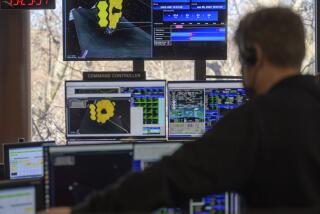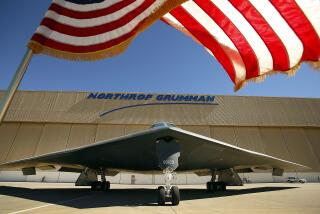Northrop, Other U.S. Firms Could Enter Into Defense Deals Abroad
- Share via
Amid escalating merger talks overseas, defense industry analysts are predicting a new wave of deals that could involve Northrop Grumman or other U.S. firms in the first major transatlantic marriage involving military contractors.
Much of the speculation is focused on Europe, where the defense industry has not yet undergone the wrenching consolidation that has radically reshaped the U.S. industry over the last five years.
Merger discussions are already well underway to combine British Aerospace and the aerospace unit of DaimlerChrysler of Germany, two of Europe’s biggest defense companies. Recently, Britain’s General Electric Co. joined the fray, talking openly about potential deals within Europe and in the U.S.
Earlier this week, GEC (no relation to General Electric in the U.S.) announced that it would split off its Marconi weapons unit from its other operations to encourage deal-making with other firms.
Lord George Simpson, GEC’s chief executive, has expressed interest in strengthening the Marconi unit’s defense electronics base in the U.S., where military budgets are more robust.
Those developments have sparked rampant speculation about possible deals involving GEC and Los Angeles-based Northrop Grumman or possibly Litton Industries of Woodland Hills, TRW Inc. or ITT Industries.
Others have suggested that one of the European giants could team with Lockheed Martin to create a global powerhouse.
“Lord Simpson is playing poker with 10 cards,” said Brett Lambert, a vice president at DFI International, a Washington consulting firm. “He has spoken to everyone, and everyone thinks they’re his first pick. . . . It leaves them all wondering what’s under the tree for Christmas.”
Northrop Grumman declined to comment on rumors about a possible deal with GEC.
“We have a very strict policy against commenting on merger and acquisition issues,” said Jim Taft, a Northrop spokesman.
The company, which saw its merger with Lockheed Martin fall apart amid Pentagon objections earlier this year, has been the subject of persistent merger speculation ever since that deal collapsed.
The company, however, has said only that it believes it can survive on its own but is nonetheless reviewing its options.
“By the end of the year, I think we’ll see a major announcement involving GEC, and then, throughout January, all the companies that were left out of the snowball dance will be talking to one another,” Lambert said. “There is pent-up demand that has been building up since the failure of the Lockheed Martin-Northrop deal.”
Some analysts doubt that any big transatlantic deal will emerge before February, when the Pentagon is set to clarify the government’s policy on foreign investment in U.S. arms makers.
Pentagon officials have reportedly hinted that deals between the U.S. and Britain would cause little worry in Washington--especially given the close cooperation the two countries displayed during the just-completed Operation Desert Fox against Iraq--but some companies may prefer to wait for a more explicit ruling.
That would be especially true for Northrop, which wasted a year trying to smooth over Pentagon and antitrust concerns over the proposed Lockheed Martin deal.
Meanwhile, analysts say nothing stands in the way of another U.S. firm striking a deal involving Northrop.
“They’ve been talking to a lot of people, and they could be either a buyer or a seller,” said Cai von Rumohr, an industry analyst at SG Cowen.
Von Rumohr noted that Northrop’s pending $1-billion tax bill--due in 2000 as part of the close-out of its B-2 program--is a deterrent for some buyers. But the company’s strong position in defense electronics could make it a good fit with Litton or TRW, and it could also bring valuable political clout and greater diversity to a company such as General Dynamics, he said.
More to Read
Inside the business of entertainment
The Wide Shot brings you news, analysis and insights on everything from streaming wars to production — and what it all means for the future.
You may occasionally receive promotional content from the Los Angeles Times.










